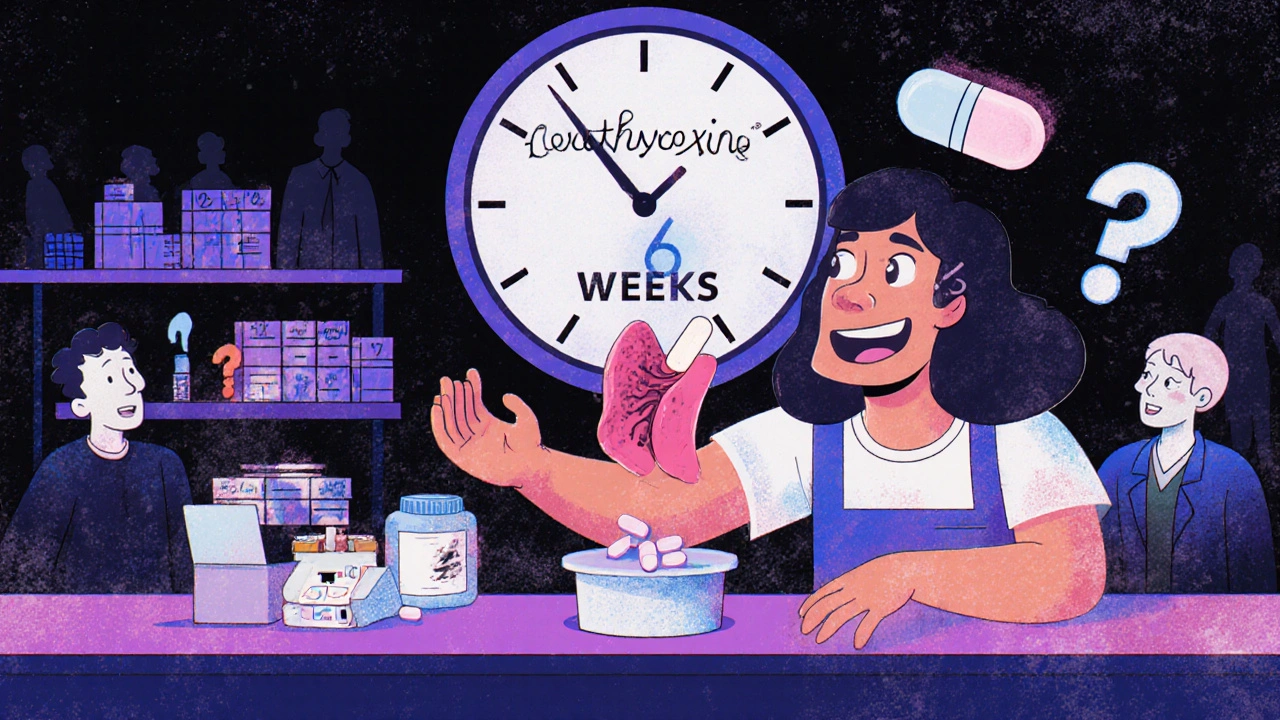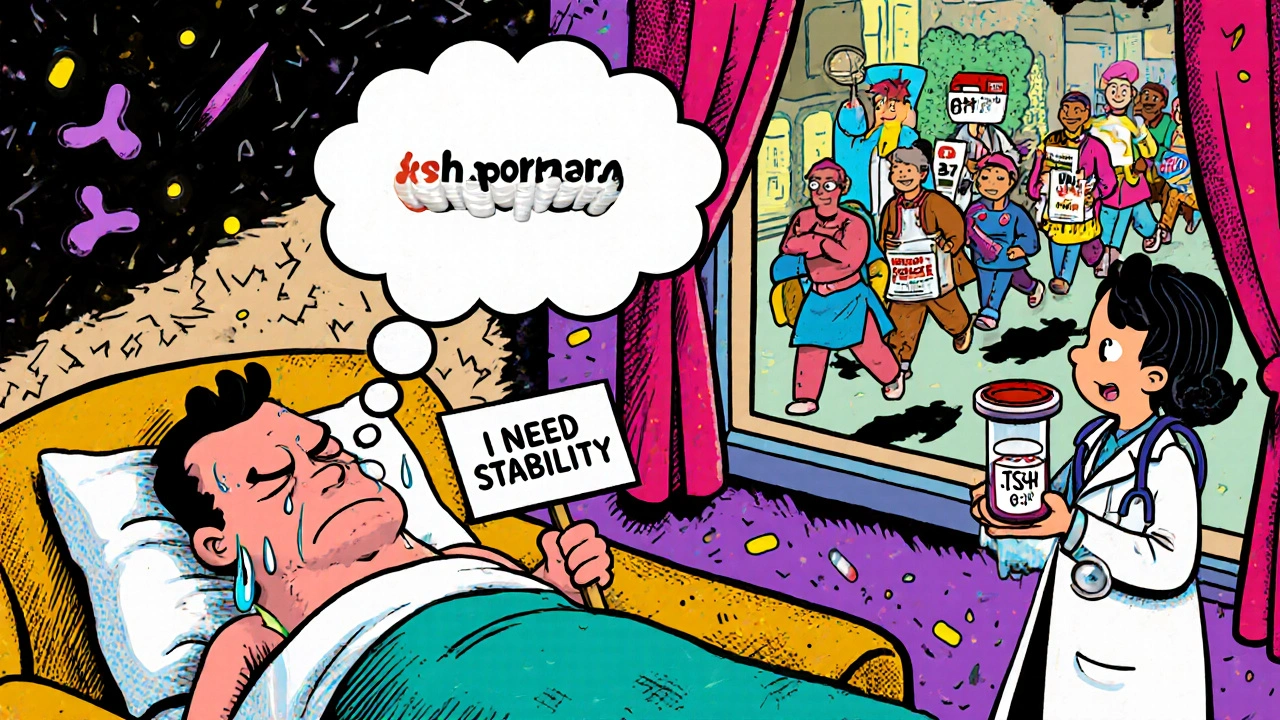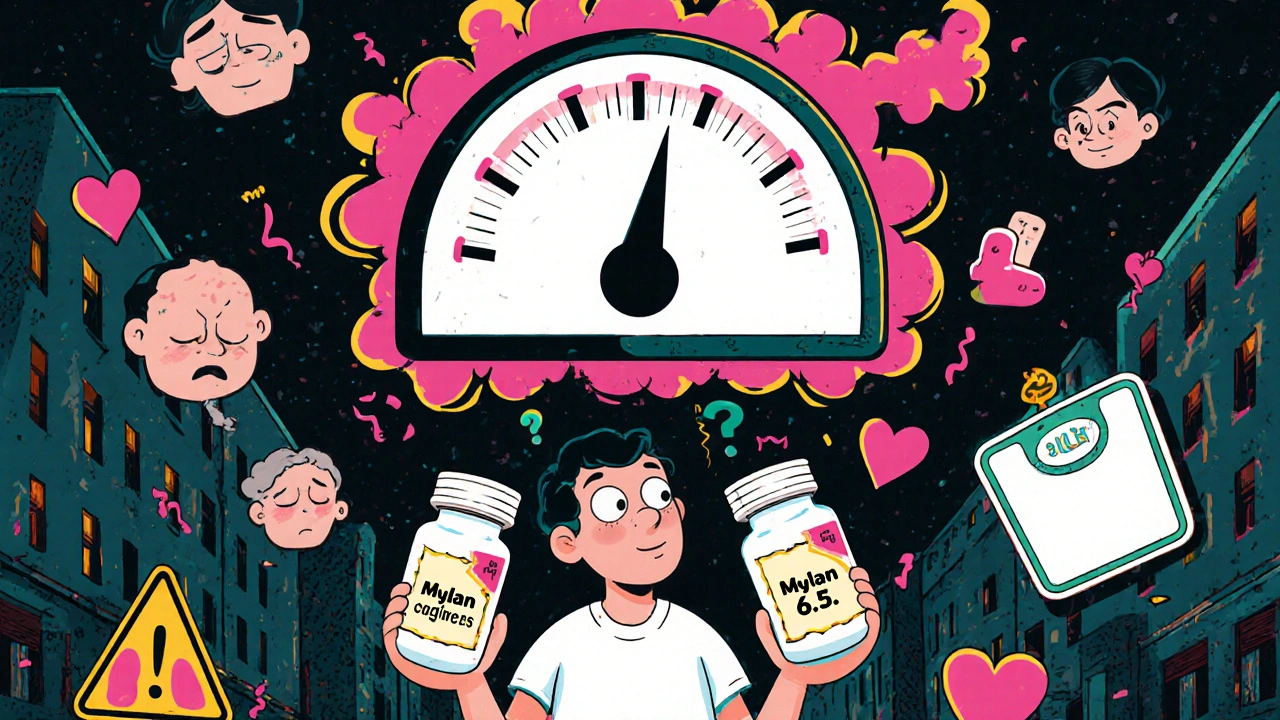Switching between different generic versions of levothyroxine is common-over 89% of prescriptions in the U.S. are filled with generics. But if your TSH suddenly climbs after a switch, you’re not imagining it. The question isn’t whether switching matters-it’s who it matters for, and when you need to check your thyroid levels.
Why Levothyroxine Is Different
Levothyroxine isn’t like switching from one brand of ibuprofen to another. It’s a narrow therapeutic index (NTI) drug, meaning tiny changes in blood levels can cause big shifts in how you feel. A 10% difference in absorption might push your TSH from 2.0 to 6.5 mIU/L, triggering fatigue, weight gain, or heart palpitations. That’s why even small differences in fillers, dyes, or manufacturing processes between generics can matter for some people.The FDA says all approved generics are bioequivalent: they must deliver 80-125% of the active ingredient compared to the brand. But for NTI drugs, that range is wide. A 25 mcg pill from Mylan might absorb slightly better than one from Teva, even if both meet FDA standards. That’s not a flaw-it’s the rule. And for most people, it’s enough.
What the Science Actually Shows
A major 2022 study in JAMA Internal Medicine followed over 15,000 patients who switched between generic levothyroxine brands. The result? No meaningful difference in TSH levels between those who switched and those who didn’t. The average TSH stayed at 2.7 mIU/L in both groups. That’s strong evidence that for the majority, switching doesn’t break thyroid control.But here’s the catch: that study looked at populations. It didn’t tell you about you.
Other studies show something different. A Dutch study found that patients taking more than 100 mcg daily had a 63% chance of abnormal TSH after switching-compared to just 24% in those who stayed on the same product. And in the UK, over 1,200 adverse reaction reports since 2015 linked product switches to symptoms like fatigue, weight changes, and heart racing. One patient on Reddit reported her TSH jumped from 1.8 to 7.2 after switching from Mylan to Teva. She needed a 12.5 mcg dose increase to get back to normal.
So what’s the real story? About 88-92% of people can switch without issue. But 8-12%? They’re sensitive. And if you’re one of them, you’ll know.
Who Needs TSH Monitoring After a Switch?
You don’t need a blood test every time your pharmacy swaps your pills. But you do need one if you fall into one of these groups:- Thyroid cancer survivors-TSH suppression is critical. Even a small change can affect recurrence risk.
- Pregnant women-Thyroid hormone needs increase by 30-50% in early pregnancy. Unstable levels raise risks for preterm birth and developmental issues.
- People with heart disease-Too much thyroid hormone can trigger arrhythmias. Too little worsens cholesterol and heart function.
- Those with a history of TSH instability-If you’ve had TSH levels swing wildly before, you’re more likely to react again.
- Anyone who feels different after a switch-Fatigue, brain fog, weight gain, or heart palpitations aren’t normal. Don’t brush them off.
If you’re none of the above and feel fine? Your doctor may skip the test. But if you’re unsure, ask for a TSH check six weeks after the switch. It’s a simple blood test. No needles, no fasting. Just a vial of blood and peace of mind.

What the Guidelines Say Now
Guidelines are shifting. The American Thyroid Association used to say: Always monitor after any switch. Their 2014 advice was clear: test TSH in six weeks.But new data changed that. In 2023, the American Association of Clinical Endocrinologists updated its stance: Routine monitoring isn’t needed for most patients. The FDA’s 2024 labeling update now says: For most patients, switching doesn’t require additional TSH monitoring beyond routine follow-up.
That doesn’t mean monitoring is gone. It means it’s targeted. The Veterans Health Administration still requires TSH testing within 60 days of any switch. Kaiser Permanente, after studying 18,000 patients, eliminated routine checks for stable patients. The UK’s NHS says: If you feel worse after a switch, test your TSH. And the European Medicines Agency still recommends testing 6-8 weeks after any change.
So it’s not black and white. It’s personalized.
Why Some Patients React
It’s not just about the active ingredient. Generic levothyroxine pills contain fillers-lactose, cornstarch, dyes, preservatives. For most people, these are harmless. But for a small group, they’re not.One study found 1.7% of patients had symptoms linked to excipient intolerance. Another found that 0.8% have a genetic variant (DIO2) that affects how their body converts T4 to T3-the active thyroid hormone. If your body can’t make enough T3, even a slight drop in absorption can leave you feeling exhausted.
And then there’s the placebo effect-or rather, the nocebo effect. If you’ve heard horror stories about switching, your brain might interpret normal fatigue as a reaction. That’s why patient stories matter. One person’s crisis is another’s non-event. But if you’re the one feeling off, your experience is real, even if it’s rare.

What to Do If You Switch
Here’s what works in real life:- Write down your current dose and brand-Keep a note in your phone or wallet. If you switch and feel weird, you’ll know what you were on.
- Don’t panic if you feel a little off-Give it 2-3 weeks. Your body needs time to adjust to even tiny absorption changes.
- Track symptoms-Fatigue? Weight gain? Heart racing? Mood swings? Write them down. Don’t rely on memory.
- Request a TSH test six weeks after the switch-If you’re in a high-risk group or just want to be sure, this is low-cost insurance.
- Ask for consistency-If you’ve had a bad reaction, ask your doctor to prescribe a specific brand. Many pharmacies will honor it. Some insurance plans allow it if you document the issue.
Pharmacists are required to tell you if your prescription was switched. Ask them: Is this the same brand I got last time? If it’s not, and you’re high-risk, speak up.
The Bottom Line
Switching levothyroxine generics is safe for most people-and saves billions in healthcare costs. But for a small group, it can cause real problems. You’re not alone if you’ve felt worse after a switch. You’re not crazy if you want to get tested. And you’re not being difficult if you ask for consistency.Here’s the rule: If you’re stable and feel fine, no test is needed. If you’re in a high-risk group-or you feel different-get your TSH checked. Six weeks after the switch is the sweet spot. That’s when changes show up in bloodwork.
Thyroid health isn’t about the pill you get. It’s about how you feel. And if you’re not feeling right, your TSH level is the best way to find out why.
Do I need to check my TSH every time I switch generic levothyroxine brands?
No-not for most people. Large studies show no significant TSH changes after switching between generics in the general population. But if you have thyroid cancer, are pregnant, have heart disease, or feel worse after a switch, a TSH test six weeks later is recommended.
Can different generic levothyroxine brands have different effects?
Yes, for a small percentage of patients. While all generics meet FDA bioequivalence standards, minor differences in fillers or manufacturing can affect absorption in sensitive individuals. Studies show 8-12% of users report symptoms after switching, and some need dose adjustments.
How long after switching should I get my TSH tested?
Six to eight weeks. Thyroid hormone levels take time to stabilize after a change in absorption. Testing too soon (within 2-3 weeks) may show false fluctuations. Waiting six weeks gives your body time to adjust and gives your doctor a clear picture.
Why do some doctors still recommend testing after every switch?
Older guidelines (like the 2014 ATA recommendations) advised routine testing. While newer evidence supports less frequent monitoring, some providers stick to the old advice out of caution, especially for patients with complex histories. It’s also easier to order a test than to explain why you’re not.
Can I ask my pharmacy to always give me the same generic brand?
Yes. You can ask your doctor to write "Dispense as Written" or "Do Not Substitute" on your prescription. Some insurance plans will cover the cost if you document previous adverse reactions. Many pharmacies will honor this request, especially if you’ve had issues before.
Are brand-name levothyroxine (like Synthroid) better than generics?
For most people, no. Brand-name and generic levothyroxine have the same active ingredient and meet the same bioequivalence standards. The main difference is cost: generics cost 90% less. Brand-name may be worth it if you’ve had consistent problems with generics and switching causes symptoms.
What to Do Next
If you’re on levothyroxine and your pharmacy just switched your pill:- Check your last TSH result. Was it in range?
- Do you have any of the risk factors: cancer, pregnancy, heart disease, unstable TSH?
- Do you feel different? Fatigued? Weight gain? Heart racing?
If you answered yes to any of those, schedule a TSH test in six weeks. If you answered no, keep taking your pills as directed. You’re likely in the 90% who won’t notice a difference.
Thyroid medication isn’t one-size-fits-all. Your body knows what it needs. Listen to it. And don’t let cost savings silence your symptoms.

Y’all act like this is some new conspiracy but the FDA’s been letting pharma companies play roulette with our thyroid meds for decades. I switched from Mylan to Teva and felt like a zombie for 3 months. My endo said it was ‘stress’ until I showed him my lab results. Now I pay out of pocket for Synthroid. Fuck cost savings when your heart’s racing at 3am.
It’s not about the pill. It’s about control. We’ve been conditioned to trust systems that profit from our compliance. The real question isn’t whether generics differ-it’s why we’re forced to accept their mediocrity as ‘good enough.’ We’re not patients. We’re data points with thyroid glands.
Look I get it. Your body’s a goddamn orchestra and levothyroxine is the conductor. One wrong note-lactose filler, pH tweak, coating thickness-and the whole damn symphony goes off-key. Some folks hear the dissonance. Others? They’re deaf to it. Doesn’t make the noise any less real. If your TSH spikes and you feel like shit? That’s your biology screaming. Listen. Don’t let a spreadsheet silence it.
The evidence presented in the JAMA study is robust and statistically significant for the general population. However, the subgroup analyses for high-risk populations, particularly thyroid cancer survivors and pregnant individuals, warrant continued clinical vigilance. I recommend adhering to the European Medicines Agency’s 6–8 week monitoring window for these cohorts, as the physiological demands during these states are non-negotiable.
bro why u stress so much? just take the pill. if u feel bad, take more. if u feel good, u good. science is just fancy words for rich people to charge more.
Let’s be honest: most people who complain about generic levothyroxine are either hypochondriacs or haven’t read the FDA’s bioequivalence guidelines. The 8–12% who ‘react’? They’re the same people who think their gluten-free kale smoothie fixes everything. This isn’t medicine-it’s wellness theater.
my doc told me to get tested after a switch but i just ignored it. turned out my tsh was 8.5. i felt like a corpse for 6 weeks. dont be me. check it. its 10 bucks at walgreens. no joke.
OH MY GOD. I KNEW IT. I KNEW THEY WERE DOING THIS ON PURPOSE. I switched from Mylan to Teva and suddenly I couldn’t get out of bed. My hair was falling out. My nails cracked. I thought I was dying. Turns out my TSH was 11.2. I cried in the pharmacy parking lot. This isn’t medicine. It’s corporate negligence dressed up as ‘cost-efficiency.’
I appreciate how balanced this post is. I used to panic every time my pharmacy switched brands, but after reading this, I realized I’m probably in the 90%. Still, I’ll keep a note of my brand and check in with my doctor if I feel off. No need to stress-but also no need to ignore my body.
bro i switched from teva to mylan last month and felt fine but my mom had a panic attack when she saw the pill color change. she called me crying thinking i was poisoned. i told her its the same drug just different dye. she still thinks the government is putting tracking chips in thyroid pills. we all got family like this.
Dear friend, your health is your most valuable asset. Please do not compromise it for the sake of cost reduction. If you experience any change in energy, mood, or physical symptoms after a generic switch, consult your physician immediately. Your life is not a budget line item. You deserve stability. You deserve consistency. You deserve to feel well.
THEY’RE USING LACTOSE AND FD&C YELLOW #6 TO CONTROL US. 😱 I’ve got the DIO2 mutation. I’ve got the histamine intolerance. I’ve got the glyphosate in my water. And now they’re swapping my thyroid meds like it’s a fucking lottery? This isn’t healthcare-it’s a biotech experiment on the working class. #ThyroidConspiracy #StopTheSwitch
Let’s cut the bullshit. The FDA’s 80–125% bioequivalence window is a joke. That’s a 45% swing in blood concentration. If you think that’s acceptable for a drug that regulates your metabolism, your heart, your brain-you’re either naive or complicit. This isn’t about ‘some people.’ It’s about systemic negligence masked as science.
I’ve been on levothyroxine for 14 years and switched generics 7 times. I track everything in a spreadsheet: dose, brand, date, symptoms, TSH. I’ve only had to adjust my dose twice-and both times, it was because I switched to a new manufacturer I’d never used before. My advice? Keep a little log. It’s not hard. And if you feel weird? Get tested. It’s one blood draw. It’s peace of mind. You’re worth the effort.
You got this. If you feel off after a switch, trust yourself. Get your TSH checked. Six weeks. Simple. No drama. No guilt. Your body knows. You’re not being dramatic-you’re being smart. Keep going. You’re not alone.